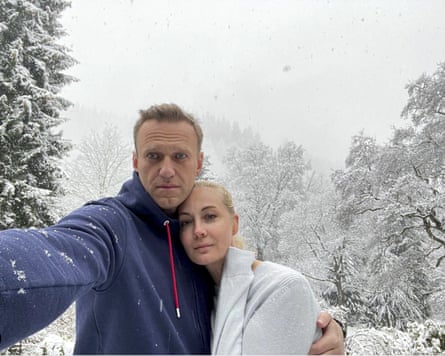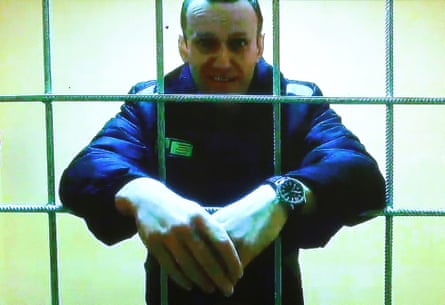Alexei Navalny knew how it would end: “I’ll spend the rest of my life in prison and die here.” He was right. On 16 February 2024, the Russian authorities announced the death of its highest profile political prisoner in colony FKU IK-3, north of the Arctic Circle. He was 47 years old.
“All anniversaries will be celebrated without me. I’ll never see my grandchildren,” he writes in the chapter that forms the epilogue of Patriot, his posthumously published memoir. “I’ll be missing from all photos.” It’s a deliberate strategy, his “prison zen” to contemplate – and accept – the worst. “Even if everything starts falling apart, they will bump me off at the first sign the regime is collapsing. They will poison me,” Navalny tells his wife, Yulia, when she visits. When she agrees, he’s ecstatic. “That was great! No tears!”
The stoicism would be remarkable but this is a man who had his underpants laced with novichok by the FSB and not only survived to tell the tale but challenged his poisoners in an early morning prank phone call (as captured in the 2022 Oscar-winning documentary, Navalny).
The assassination attempt forms the first chapter of Patriot, though Navalny, a lifelong ironist, manages to turn what should be the plot of a James Bond film into a black comedy. He’s on a flight in Siberia when the nerve agent kicks in. “I have been poisoned and am about to die,” he manages to tell the flight attendant. He is wrong about that. Eighteen days later, he emerges from a coma in a hospital in Berlin, with his commitment to fighting Putin stronger than ever.
Navalny was arrested as soon as he returned to Russia of course. Putin wasn’t going to let him get away again and he became the most closely guarded prisoner in the country’s prison system. He details the relentless and intrusive surveillance to which he was subjected: bodycams on all guards; cameras everywhere; everything logged; he even suspects that there is a high-definition camera positioned over the table where he wrote this book.
Patriot is a bittersweet read, not least because we now know that Navalny was tantalisingly close to being released in a prisoner exchange this summer. And the outpouring of grief at the news of his death was not just at the loss of the greatest political figure of his generation – the greatest president many Russians believe they never had – but the passing, too, of an alternative future that he represented.
 View image in fullscreen
View image in fullscreen
Because here, on the page, is the voice of the charismatic, funny, adept communicator who for a time conjured a vision of another Russia – what he called the “beautiful Russia of the future”. Navalny describes how he exploited the new digital possibilities of the internet to connect with a new generation of Russians who expected and wanted more. It was Navalny’s bold and brilliant YouTube investigations into corruption that made him a star, and he was loathed and feared by the Kremlin for his bravery.
His plan, he says, was to write “an autobiography with an intriguing thriller about uncovering an assassination attempt using chemical weapons”. But then, in January 2021, just months after surviving the FSB’s attempt to kill him, he returned to Moscow and was arrested before he’d even entered border control.
It was another lesson in bravery. Navalny knew he couldn’t just tell his fellow Russians what to do; he had to model it. He had to show them that Putin’s regime was not to be feared – it was to be defied. But the downside, from his point of view, is that his pacy thriller turned into “a prison diary”.
Over the next decade, he became a force in Russian politics that even a deadly nerve agent couldn’t stop
Even recognising a shared experience and literary heritage with the greats of modern Russian literature such as Alexander Solzhenitsyn and Vladimir Bukovsky becomes material for comic irony. “It’s a genre so saturated with cliches that it’s impossible not to write them,” he says. “If I got a dollar for every ‘We didn’t get to say goodbye’ encountered in such literature, I’d be like Elon Musk.”
But the genre refuses to die because so does Russia’s appetite for jailing political dissidents. On the day Navalny learns he’s won the Sakharov prize – named after Andrei Sakharov, the Russian nuclear physicist and Nobel peace prize winner exiled for his beliefs – he writes that “it struck me that in so many photographs Sakharov had the exact same kind of hat I have now”.
The early sections in Patriot cover his formative years. The son of an army officer and a bookkeeper mother, Alexei Anatolyevich Navalny was raised in a military town outside Moscow, in a family for whom the Chornobyl nuclear disaster loomed large. He was a bright child whose parents valued education, a “nerd” who preferred reading to sport, and who learned how to overcome an older bully using a combination of reckless bravery and daring surprise – a strategy that would serve him throughout his life.
 View image in fullscreen
View image in fullscreen
As a “thin, pale Moscow townie” brought up as a Soviet atheist, he spent childhood holidays with his religious Ukrainian grandmother in her village a few miles from the nuclear plant. Sent to the countryside to be “fattened up with Ukrainian pork lard”, he avoided “a straight answer” as to whether he was Russian or Ukrainian. “It was like being asked who you loved more, your mother or your father,” he complained.
It’s a significant detail given the accusations of nationalism that have dogged his political career. In his words, his grandmother’s village was a “paradise on Earth”, until the explosion. Almost as bad as the radiation that followed were the lies. In his telling, it’s an experience that would go on to make him understand that politics was “personal”.
skip past newsletter promotionSign up to Observed
Analysis and opinion on the week's news and culture brought to you by the best Observer writers
after newsletter promotion
In the Russia of the early 90s, “it seemed obvious that in the new world of a market economy there would only be two professions left” – economists and lawyers. He picks the second and lands the kind of job to which most “new” Russians aspired: a corporate lawyer for the kind of flashy firm that took the entire company on a corporate retreat to a Turkish resort. Here he meets a woman, Yulia, and immediately thinks, This is the girl I will marry.
“When you meet your soulmate, you just know,” he says, and her presence is threaded through the book, as stoic and committed as him. After the birth of the couple’s first child, Dasha, Navalny starts volunteering for an official opposition party, a conventional route for a conventional politician that makes for a conventional retelling. It’s only when he falls out with the leader and takes matters into his own hands – using the power of the early internet – that his life and the narrative takes off.
In jail a retinue of Kremlin-paid 'activists' follow Navalny around to shout abuse at him
“I wanted to do things differently,” he writes, and he did. First with his blog documenting egregious cases of official corruption (“How to Cook the Books at Transneft” was an early headline), then came videos. He relied on crowdfunders rather than oligarchs, a revolution in Russian politics. And he involved ordinary people in everything he did, from being activist investors in state companies to finding evidence of dodgy officials. Over the next decade, Navalny became a force in Russian politics that even a deadly nerve agent couldn’t stop.
His worries about the cliches of the prison diary genre are misplaced. The second half of Patriot is as compelling as it is painful. The grinding grimness of a Russian prison regime, with its baroque and excruciating punishments, such as a retinue of Kremlin-paid “activists” who follow Navalny around to shout abuse at him, is offset by his bone-dry humour. This is Solzhenitsyn crossed with Rick and Morty, Navalny’s favourite satirical cartoon show.
At one point, Maria Butina, accused of being a spy in the US and now a Russian TV presenter, bursts into his prison to film him. He catches the broadcast and dolefully describes himself as “a lanky, stooped dude wearing clothes three times too large for him. It looked a lot less cool than I imagined.”
But the gaps between entries tell their own powerful story – whether he is on hunger strike and too weak to write anything more than to catalogue his weight (diminishing each day), or lost inside the prison system for weeks while being transported between colonies, or when there’s simply no time in his regimented day.
Throughout, there’s the absurdity of the Putinist regime and its casual brutality. At one point, Navalny reports that he is no longer considered an escape risk and can be removed from the intensive surveillance register. “My joy was so boundless the director had to ask me to be calm and speak only when permitted to do so,” he writes. But then, immediately afterwards: “It is proposed that convict Navalny is placed on the intensive surveillance register as an extremist and terrorist.” It’s not so bad, he jokes. He doesn’t have to kiss a portrait of Putin. There’s just “a sign above my bunk saying I’m a terrorist”.
“If they finally do whack me,” he writes at one point, half joking, half deadly serious, “this book will be my memorial.” It’s less a memorial than a handbook on how to stand up to a bully, the mission of his life. It’s not just Russians he showed how to do so with humour and grace and without fear, but the rest of us too. And there’s a surprise at the end: his Ukrainian grandmother’s religion wins out over his Soviet atheism. It’s the pillar of his faith alongside his unshakable belief in his “beautiful Russia of the future”. To borrow a hint of Navalny’s relentless optimism, maybe Patriot is one small step towards making that day come true.
Patriot by Alexei Navalny is published by Bodley Head (£25). To support the Guardian and Observer order your copy at guardianbookshop.com. Delivery charges may apply
∎